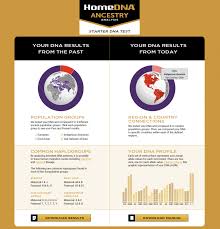Unveiling Your Heritage: The Power of Home DNA Ancestry Testing
The Rise of Home DNA Ancestry Tests
In recent years, home DNA ancestry tests have surged in popularity, offering individuals the opportunity to uncover their genetic heritage with just a simple swab of saliva. These tests provide a fascinating glimpse into one’s ancestry, revealing details about ethnic origins, migration patterns, and genetic predispositions.
One of the key appeals of home DNA ancestry tests is their convenience. With just a few clicks online, individuals can order a test kit, collect their DNA sample at home, and send it off for analysis. Within weeks, they receive detailed reports outlining their genetic makeup and ancestral connections.
These tests utilize cutting-edge technology to analyze an individual’s DNA and compare it against vast databases of genetic information from around the world. By examining specific markers in the genome, these tests can pinpoint regions where one’s ancestors likely originated and trace migration patterns over generations.
Besides satisfying curiosity about one’s roots, home DNA ancestry tests can also have practical applications. They can help individuals connect with long-lost relatives, uncover hidden family secrets, or even provide insights into potential health risks based on genetic predispositions.
However, it is essential to approach these tests with caution. While they offer valuable information about ancestry and heritage, the results are not always definitive or comprehensive. Factors such as sample quality, database size, and algorithm accuracy can influence the accuracy of the findings.
As the popularity of home DNA ancestry tests continues to grow, so does the debate surrounding privacy concerns and data security. Individuals should carefully review the terms and conditions of testing companies to understand how their genetic data will be stored and shared.
In conclusion, home DNA ancestry tests represent a powerful tool for exploring one’s genetic heritage and connecting with distant roots. By leveraging advances in genetic technology, these tests offer a window into our shared human history and provide a deeper understanding of who we are and where we come from.
Choosing the Best Home DNA Test: Accuracy, Value, and Comparisons Between 23andMe and AncestryDNA
- What’s better, 23andMe or AncestryDNA?
- Are home DNA ancestry tests accurate?
- Is ancestry DNA test worth it?
- How accurate are at home DNA paternity tests?
What’s better, 23andMe or AncestryDNA?
When comparing 23andMe and AncestryDNA for home DNA ancestry testing, the choice ultimately depends on individual preferences and priorities. 23andMe is known for its detailed health reports in addition to ancestry information, providing insights into genetic health risks and traits. On the other hand, AncestryDNA focuses primarily on genealogical research and connecting individuals with potential relatives through a vast genealogy database. Both services offer unique features and strengths, so it’s essential to consider whether health insights or genealogical connections are more important to you when deciding between 23andMe and AncestryDNA for your DNA ancestry testing needs.
Are home DNA ancestry tests accurate?
The accuracy of home DNA ancestry tests is a common concern among individuals considering genetic testing to uncover their ancestral origins. While these tests can provide valuable insights into one’s genetic heritage, it is important to understand that their accuracy may vary based on several factors. Factors such as the size and diversity of the testing company’s database, the quality of the DNA sample provided, and the algorithms used for analysis can all impact the accuracy of the results. While home DNA ancestry tests can offer intriguing information about one’s ancestry, it is advisable to interpret the results with a degree of caution and consider consulting with genetic counselors or professionals for a more comprehensive understanding of the findings.
Is ancestry DNA test worth it?
The question of whether an ancestry DNA test is worth it often depends on individual goals and interests. For many people, the opportunity to uncover hidden family connections, explore diverse ethnic origins, and gain insights into their genetic heritage makes these tests highly valuable. They can provide a fascinating journey into one’s past and offer a sense of identity and belonging. However, it is essential to consider factors such as privacy concerns, data security, and the limitations of genetic testing before deciding if an ancestry DNA test is worth the investment. Ultimately, the decision to take an ancestry DNA test should be based on personal curiosity, cultural exploration, and a balanced understanding of the potential benefits and drawbacks.
How accurate are at home DNA paternity tests?
The accuracy of at-home DNA paternity tests is generally high when performed correctly and with reputable testing companies. These tests rely on analyzing specific genetic markers to determine biological relationships, such as paternity. While the results are typically considered reliable, it is essential to follow the instructions carefully to ensure accurate sample collection and processing. Factors like sample contamination or improper handling can potentially affect the results. It is recommended to choose a reputable testing provider with a proven track record for accurate and reliable results when considering an at-home DNA paternity test.

